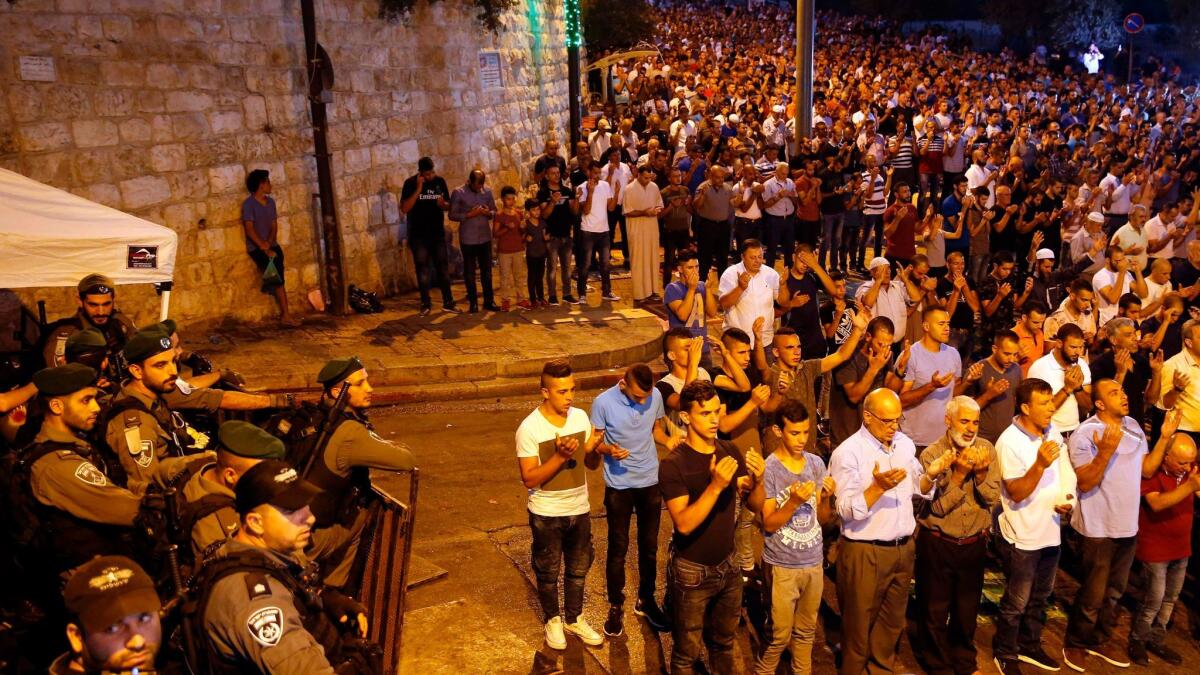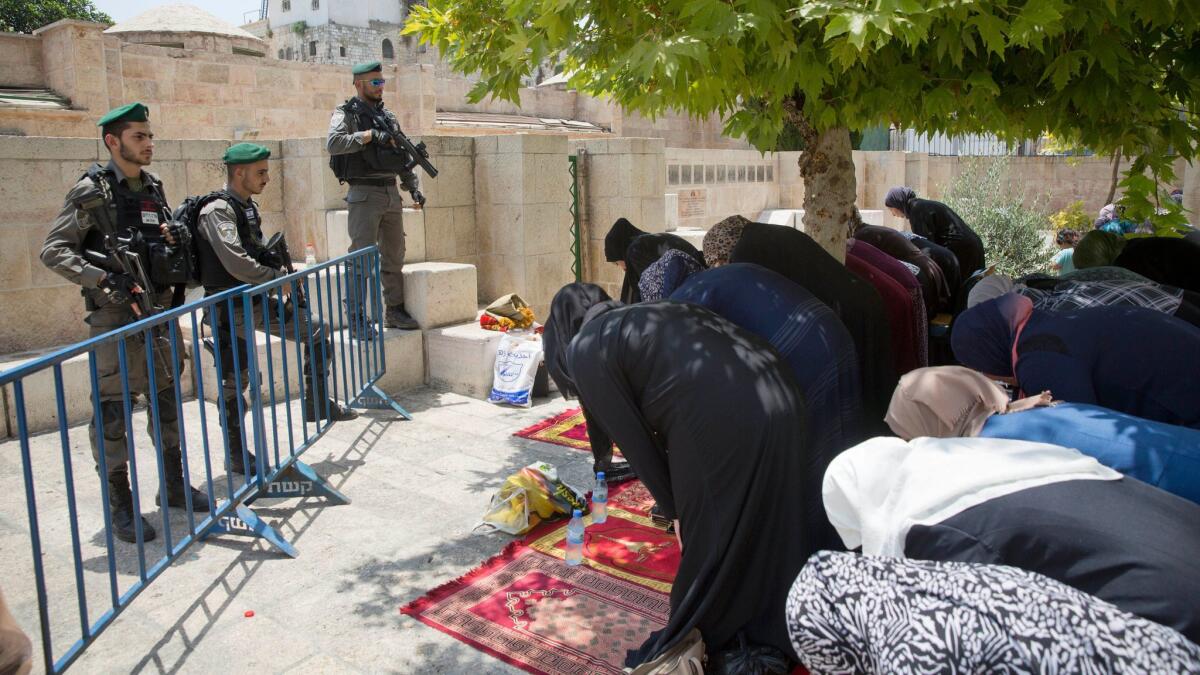Palestinians keep up holy site boycott despite Israel’s removal of metal detectors

- Share via
Reporting from JERUSALEM — Violent clashes broke out in Jerusalem’s Old City on Tuesday evening as Muslim worshipers kept up mass demonstrations and refused to enter a sacred plaza outside a contested shrine, even after Israel removed the metal detectors that had sparked the unrest.
The move by Israel was a bid to defuse tensions that have sown a tide of unrest and a diplomatic crisis.
But mass prayer services devolved into rock throwing, with Israeli police forcibly dispersing the demonstrators with sound bombs. A witness said that several demonstrators were injured by police gunfire.
The escalation in tensions began July 14 when an Arab Israeli shot and killed two Israeli police officers at the holy site, prompting Israel to install metal detectors. The plaza is revered by Jews as the site of the Temple Mount and sacred to Muslims as the Noble Sanctuary where the prophet Muhammad rose to heaven.
Following days of quiet talks with Jordan — the official custodian of the Muslim sites in Jerusalem — and mediation from the White House, Israel’s Cabinet voted to replace the metal detectors with $29 million worth of high-resolution cameras equipped with “smart” technology to inspect worshipers.
But leaders of the Muslim Waqf authority at the holy site announced on Tuesday morning that the new surveillance devices would still be an unacceptable infringement on the rights of the worshipers and instructed followers to remain outside the complex in protest.
Palestinian Authority President Mahmoud Abbas said Tuesday that he would not resume contacts with Israel until stepped-up security measures around the plaza were canceled. At the same time, he said his government would “study” “the new developments” to “decide where to go from here.”
At dusk Tuesday, thousands of demonstrators packed a cobblestone street at the Lions Gate entrance to the holy plaza, opposite police in riot gear clutching machine guns. Protesters chanted, “We are not afraid of your cameras,” and called for “rockets” and “bullets” against Israel.
A few hundred feet from where the metal detectors once stood, the worshipers lined up in rows and knelt and bowed amid calls of “God is great.”
In a brief sermon, a speaker acknowledged the challenge of keeping demonstrations going after the removal of the metal detectors.
“Don’t become bored, don’t become frustrated,’’ the cleric told the worshipers. “We must remain united.”
The holy plaza was nearly empty, save for foreigners and Jewish visitors.
An Israeli Cabinet minister on Tuesday morning said the metal detectors created more problems than they solved.
“They cause tensions with our neighbors and our enemies took advantage of it,’’ Energy Minister Yuval Steinitz said in an interview with Israel’s public radio. “The considerations are not just security on the Temple Mount. They are strategic [and] geopolitical.”
With the metal detectors gone, Israel said that it would reinforce security detachments around the holy esplanade, and police patrolled the streets nearby in teams of four, holding machine guns.
Asked if tensions had calmed, an Israeli policeman guarding an entrance where the metal detectors once stood shrugged. “We don’t trust their calm,” he said.
Nearby a group of religious Israeli Jews listened to a tour guide recount how Israel’s army entered the holy esplanade when it conquered the Old City in the 1967 Six-Day War and bemoan the army’s decision at the time to allow the Muslim Waqf continued control at the holy site.
Many conservative Israelis want the government to assert its sovereignty at the plaza by allowing visits of politicians and eliminating a ban on non-Muslim prayer.
Tsippora Tsvibel, a 32-year-old educational counselor, said the decision to remove the metal detectors was “a surrender to all the pressure.”
Demonstrators said that even though Israel’s removal of the security gates marked a momentary win, the advanced surveillance equipment was evidence that Israel wants to boost control over the holy site.
“We don’t feel victory, because the cameras are worse than the metal detectors,” Salah Abu Sneineh, a 48-year-old construction worker, said after the evening prayers. The sermon, he said, “was asking people to stay right here. I think people believe that we can stay here for a year.”

Mitnick is a special correspondent.
UPDATES:
4:50 p.m.: This article was updated with staff reporting from the scene of the clashes.
This article was originally published at 9 a.m.
More to Read
Sign up for Essential California
The most important California stories and recommendations in your inbox every morning.
You may occasionally receive promotional content from the Los Angeles Times.












